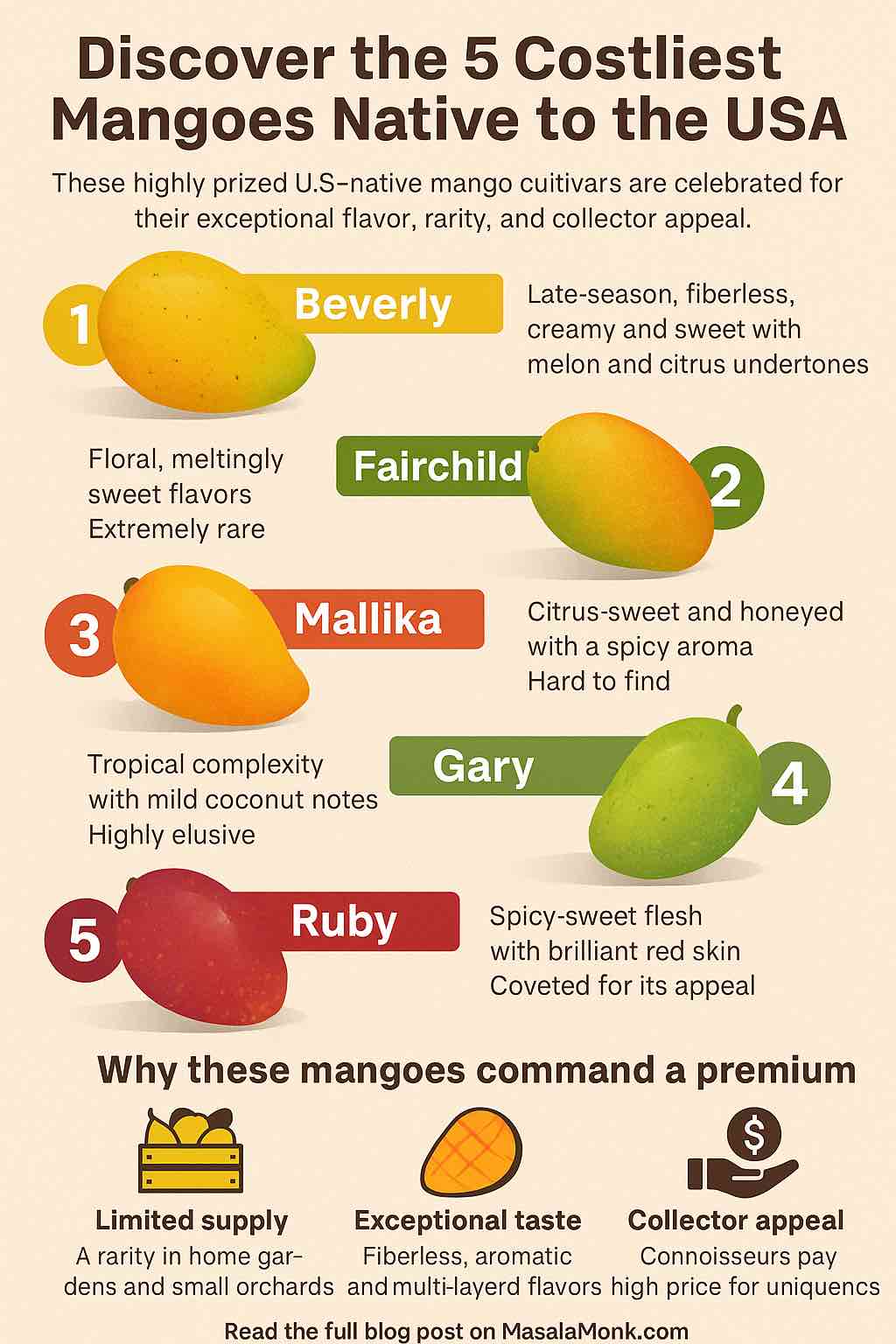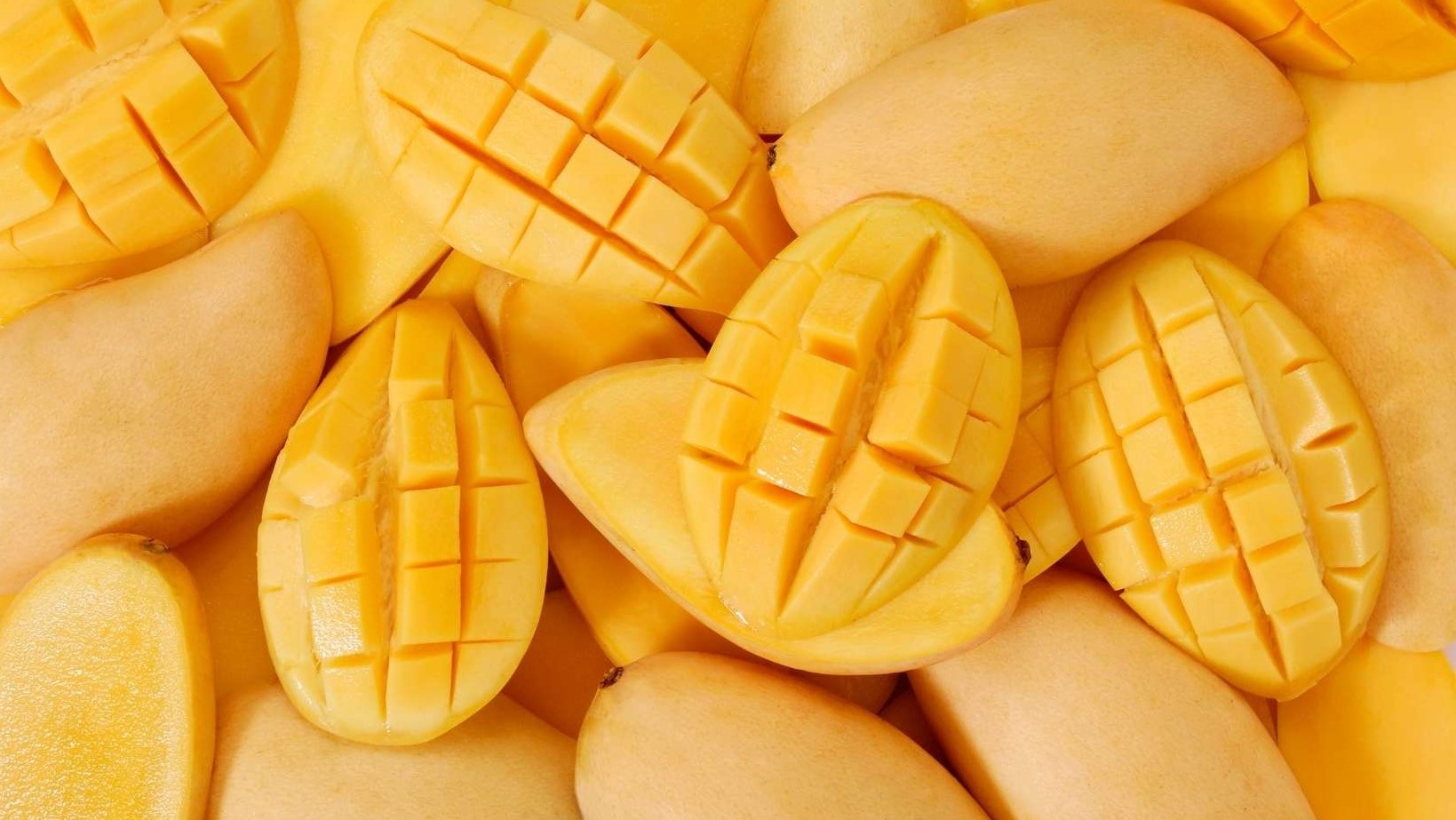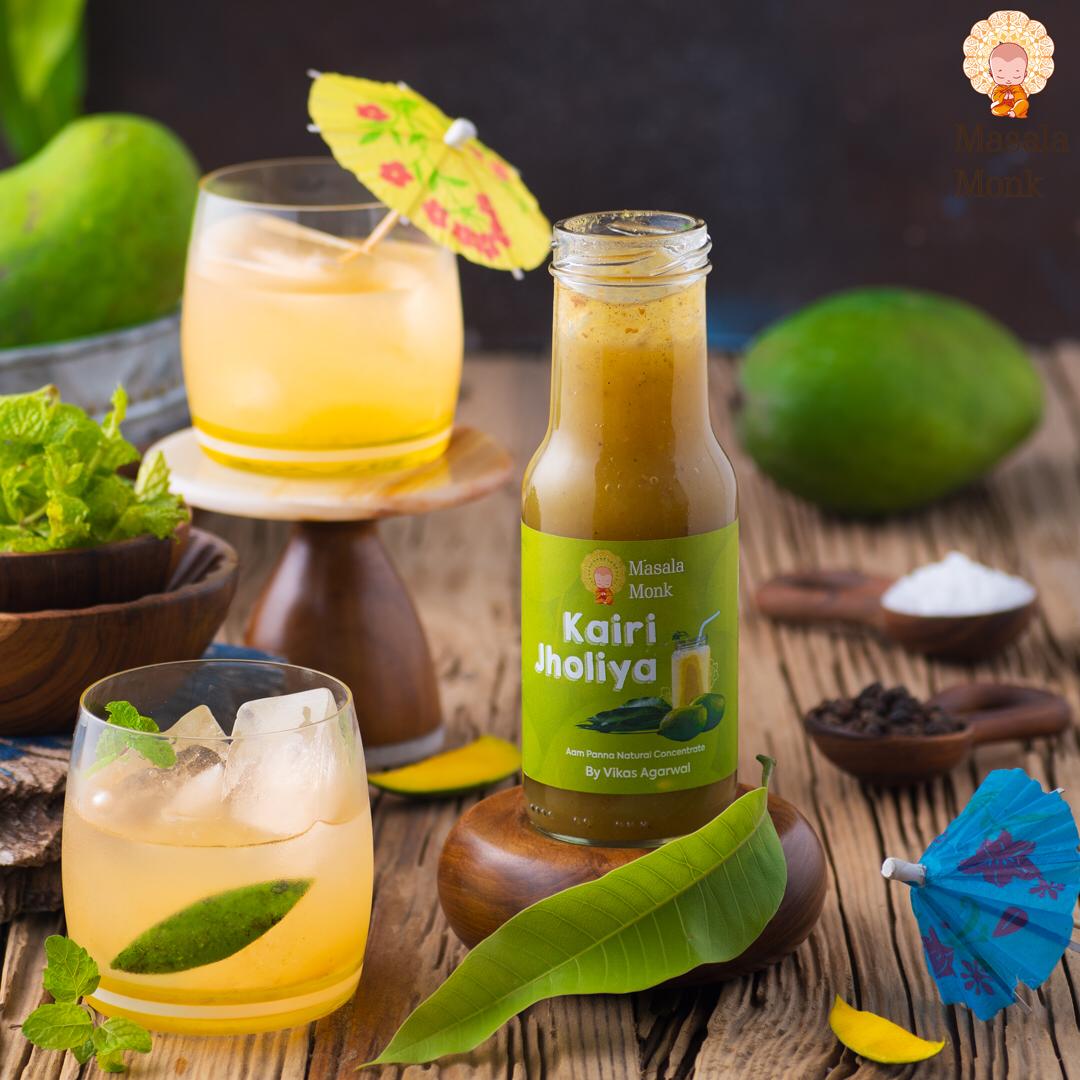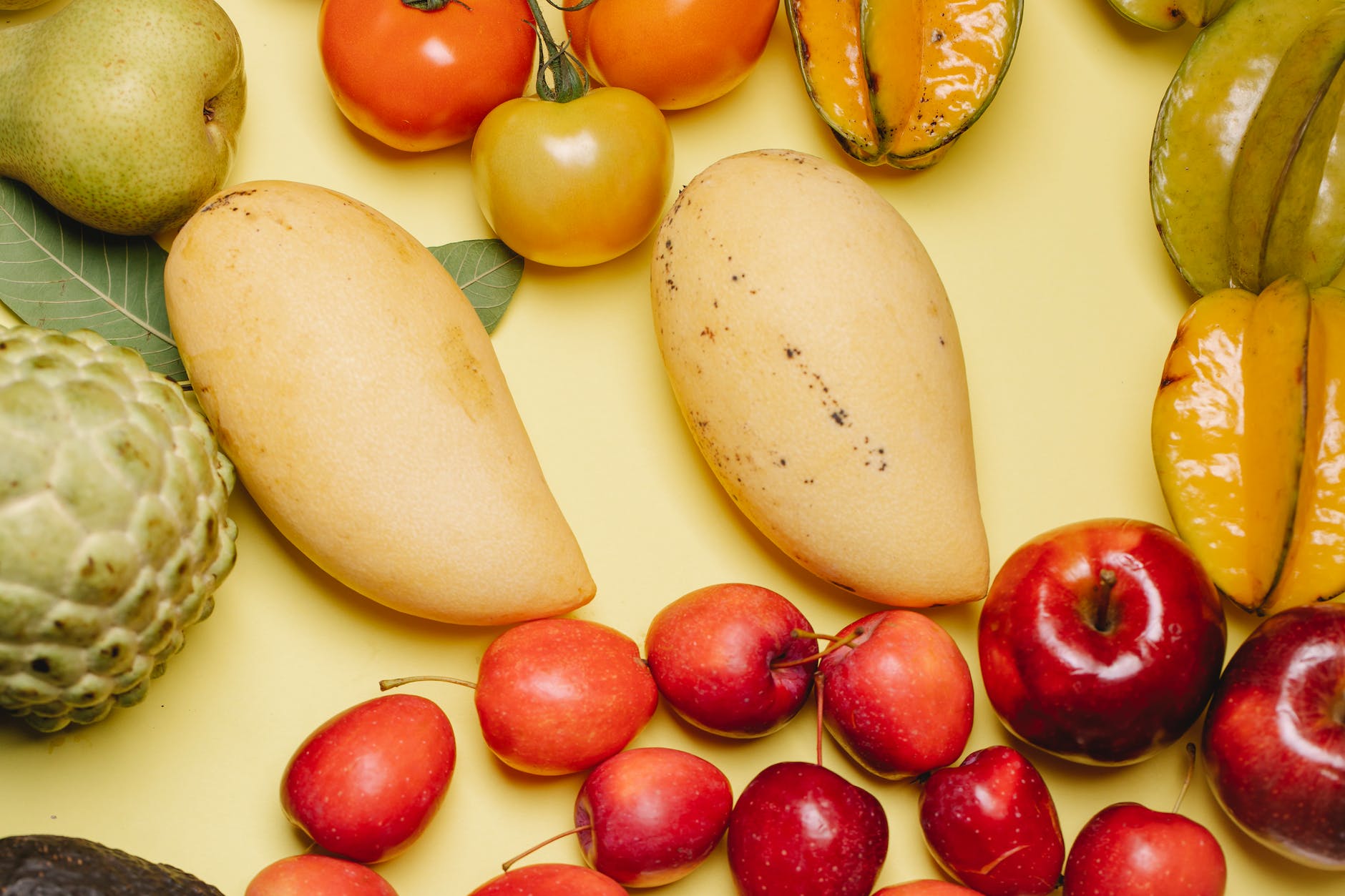
If you think the world’s most exotic mangoes only come from India or the Caribbean, you’re in for a surprise! The United States—especially Florida—has quietly become a mango connoisseur’s paradise, with rare and expensive cultivars that rival anything grown overseas. Whether you’re a passionate fruit collector, a backyard gardener, or simply someone who dreams of the juiciest, most flavorful mangoes money can buy, this guide is for you.
Let’s dig deep into the five costliest mangoes native to the USA, exploring what makes them so special, what they taste like, how to find (or even grow) them, and why they command such high prices in 2025.
1. Beverly: The Late-Season Treasure
What Makes Beverly So Special?
Developed by the legendary Zill family in South Florida, Beverly mangoes are a cult favorite among collectors and boutique fruit markets. Unlike most commercial mangoes, Beverly’s magic is its late-season ripening—often available in August and September, when other varieties are long gone.
Flavor Experience
Beverly is famous for its:
- Creamy, fiberless texture
- Classic “Florida-mango” sweetness
- Melon and citrus undertones
Why So Costly?
- Rarity: Grown mainly in small orchards and home gardens; rarely available in supermarkets.
- Premium pricing: In 2025, a 5-lb box from Glamorous Acres Farm runs $69, and an 8-lb box can go for $89.
- Grafted trees: For backyard growers, expect to pay $90–$325, depending on size.
Practical Tip
To experience Beverly at its best, source directly from Florida boutique farms. For home growing, order a grafted tree from a reputable nursery and enjoy late-season mangoes when everyone else’s supply has run dry.
2. Fairchild: The Collector’s Delight
What Makes Fairchild Unique?
Named after the famed botanist David Fairchild, this mango is a piece of horticultural history. Prized for its unique floral notes and melting flesh, Fairchild is a true collector’s mango.
Flavor Experience
Expect:
- Intensely aromatic, almost perfumed flesh
- Melting, fiberless texture
- Balanced sweetness
Why So Costly?
- Extreme scarcity: Very little commercial cultivation; fruit is typically found at local Florida mango festivals or via private growers.
- High per-fruit price: When available, often sold individually or by the pound at premium prices.
Practical Tip
Track down Fairchild at mango festivals (like the Fairchild Garden Mango Festival in Miami) or through fruit-sharing communities. If you’re a serious hobbyist, investing in a tree can pay dividends for years to come.
3. Mallika: The Citrus-Sweet Superstar
What Makes Mallika Stand Out?
Though its ancestry traces back to Indian cultivars, Mallika has become a Florida favorite due to its explosively sweet, citrus-honey flavor and its fiberless, silky flesh. It’s a winner at every taste test.
Flavor Experience
Mallika offers:
- Bold citrus, honey, and melon notes
- Zero fiber
- Excellent aroma and juiciness
Why So Costly?
- Limited production: Only a handful of specialty growers produce Mallika at scale.
- Current pricing: In 2025, a 3-kg box (about 8–11 fruits) sells for around $50.
- Popular with growers: Grafted trees are around $90.
Practical Tip
For the best flavor, let Mallika ripen fully off the tree—this “post-harvest ripening” is the secret to its extraordinary taste. Pre-order boxes from Florida specialty fruit vendors for the June–July season.
4. Gary: The Coconut-Kissed Rarity
What Makes Gary Coveted?
Another gem from the Zill breeding program, the Gary mango is almost mythical among mango lovers. It’s famous for its unique coconut undertones and rich, tropical complexity.
Flavor Experience
Gary is described as:
- Mildly sweet, rich, with a hint of coconut
- Smooth and creamy
- A true “taster’s mango” for those who love subtlety
Why So Costly?
- Ultra-low yields: Gary trees don’t produce heavily and are sensitive to disease.
- Niche supply: Usually available only by special request, through mango festivals, or private orchards.
Practical Tip
Your best bet to taste Gary mangoes is to connect with Florida mango societies or attend fruit festivals where collectors trade and sell rare varieties. If you can find a tree, plant it for a unique homegrown treat.
5. Ruby: The Boutique Beauty
What Makes Ruby Rare?
Ruby mangoes live up to their name with their brilliant crimson skin and beautiful presentation. Originating from Miami, Ruby is beloved for both its looks and its spicy-sweet flavor.
Flavor Experience
Ruby delights with:
- Spicy, sweet, aromatic flesh
- Low fiber
- Stunning color—perfect for fruit platters
Why So Costly?
- Scarcity: Grown only by a handful of enthusiasts and boutique orchards.
- Collector demand: When available, often commands prices of $10+ per fruit.
Practical Tip
Ruby trees are sometimes available from specialty nurseries. If you spot Ruby mangoes at a local farmer’s market or fruit festival, grab them—they’re usually gone in hours!
Why Are These Mangoes So Expensive?
- Scarcity: Most of these varieties are not grown commercially at scale. You’re buying something truly rare.
- Flavor Complexity: Each mango offers a unique, often multi-layered eating experience you simply can’t find in supermarket mangoes.
- Collector Value: Like rare wine or craft coffee, the rarity and reputation among mango enthusiasts drive prices up.
- Labor-Intensive: These mangoes are often hand-harvested and handled with care, further adding to their exclusivity.
How to Source or Grow These Mangoes in 2025
- Boutique Farms & Orchards: Florida is the best source—look for direct-shipping from farms like Glamorous Acres or order trees from Everglades Farm and similar nurseries.
- Mango Festivals: Time your visit to coincide with Florida’s annual mango festivals (Fairchild Garden’s festival is a must-visit!).
- Online Nurseries: Many reputable sellers ship grafted trees nationwide—order early, as rare varieties sell out quickly.
- Backyard Growing: If you live in USDA zones 9b–11, you can grow these mangoes at home. All require warm weather, well-drained soil, and some patience, but the payoff is huge.
Final Thoughts: For the True Mango Aficionado
Sampling America’s rarest and costliest mangoes is a revelation—once you taste a perfectly ripe Beverly, Mallika, or Ruby, you may never look at supermarket mangoes the same way again. These cultivars aren’t just fruit; they’re living treasures, each with its own history, flavor journey, and devoted following.
So whether you’re ready to track down a box of these delicacies or plant your own backyard orchard, remember: the best mango is the one you’ve waited for, paid a little extra for, and savored to the very last bite.
🍋 Ready to take your mango obsession to the next level?
- Have a favorite mango memory or want to share tips for sourcing rare varieties? Drop a comment!
- Need advice on starting your own mango grove? Reach out for personalized growing tips.
- Looking for real-time info on fruit availability? Subscribe for seasonal alerts from Florida’s top mango growers.
Happy mango hunting!
FAQs
1. What makes these mango varieties so expensive compared to regular supermarket mangoes?
These mangoes are rare, often grown in small batches or private orchards, and offer complex flavors not found in commercial varieties. Their scarcity, flavor excellence, and collector demand drive up their price.
2. Where can I actually buy these mangoes in the United States?
Most are available from Florida-based specialty farms and nurseries, mango festivals, or boutique online sellers. Farms like Glamorous Acres and Everglades Farm offer fruit boxes or grafted trees when in season.
3. Can I grow these rare mangoes at home outside of Florida?
Yes, if you live in USDA zones 9b–11 (southern Florida, southern Texas, parts of California and Arizona). For colder climates, mangoes must be grown in large containers and protected from frost.
4. When is the best time to find and buy these mangoes?
Peak season for most Florida mangoes is May to September. Beverly ripens late (August–September), while Mallika and Fairchild are generally available in early to mid-summer.
5. Are these varieties available in supermarkets?
Almost never. They’re usually sold directly by growers, at farmer’s markets, or through pre-order. Some local specialty fruit stores in South Florida may carry a few.
6. How much does a box or tree of these mangoes cost?
Fresh fruit boxes typically range from $50 to $90 per box. Grafted trees can range from $60 for small pots to $325 for larger, mature trees.
7. Do these mangoes require special care if I want to grow them?
They thrive in full sun, well-drained soil, and warm, humid climates. Most are disease-resistant, but they do require regular watering and occasional fertilizer. Protect young trees from frost.
8. What’s the flavor difference between these varieties and common types like Tommy Atkins?
These premium mangoes are typically fiberless, sweeter, and much more aromatic, with unique notes like citrus, honey, spice, or coconut, compared to the blandness and fibrousness of commercial types.
9. Are these mangoes organic or non-GMO?
Most boutique farms use sustainable or organic practices, and all these varieties are non-GMO. However, always check with the seller for specific certifications.
10. How do I know when these mangoes are perfectly ripe?
Each variety has subtle signs—generally, look for a slight softness when pressed and a strong fruity aroma at the stem. Mallika is best ripened off the tree; Beverly and Fairchild should yield gently to pressure.













